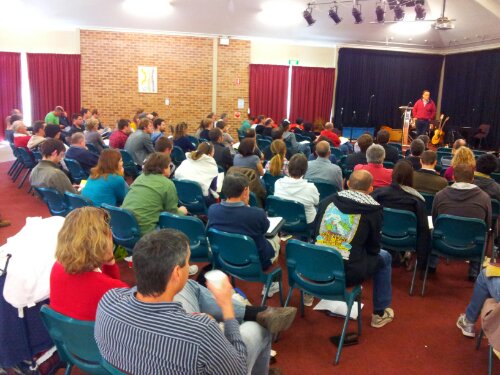It’s not news to tell you that, as a minister, I think about church.
Some thought is theological (what does God say about church?). Some is social or cultural (what does church look like in Australia?, what do my neighbours think when they hear ‘church’?). And some is pragmatic (what should we do this Sunday?, how can we better help our leaders do what they do?). These categories overlap, of course, but it helps to know about the different angles or perspectives we can take.
This is a pragmatic post about church: I suggest a way to think about what church does.
My suggestion: we should think that a church service is like a flag. Specifically, a military flag, a battle standard.
(If you click on the image, you can buy your own modern reproduction of a Roman standard. Perhaps every church should have one. No – I’m not spruiking for them!)
As an admitted military innocent, allow me to consider the use of a flag on the battle field.
A flag doesn’t really do anything. It’s not a weapon (except in desperation?). It issues no orders. It does not analyse the ebb and flow of battle. It provides no materiel. It fails to function as a medic. But it does reduce your fighting force – a bloke has to carry it about.
For all that, the military standard appears important. It does not flight, but those who do fight co-ordinate themselves around it. The flag stands central to the battlefield, defining what the war is. Its appearance is a message of motivation: this is who we are, and this is also why we fight. If the flag-bearer falls, it’s imperative that someone else take his place.
Without the flag, soldiers risk being scattered about the field. They can end up expending heaps of energy but to no good purpose. And remember, war is dangerous. It’s cruel to ask people to risk hurt without purpose.
And church?
Church doesn’t really do anything, either. Except exist as church. It sometimes looks like nothing more than a bunch of people gathering repeatedly out of habit. There’s a sameness about church – just as there should be (after all, the theology of church hasn’t changed since the first century AD).
Church does not have a profit motive, like a company board of directors. Church does not aim to win a premiership, like a training squad. It does not even seem to be as useful as other Christian group activity: going door-knocking; visiting the sick; establishing an orphanage.
But for all that, I am convinced that without church Christians would do nothing. Church is a central signal of who we are are whom we follow. Church is necessary, encouraging, motivating, challenging, painful, joyful. The people of God should love the church God has given us.
Who is it that hates church? It is those who hate the military standard on the field of battle: the enemy. I must ask God for strength not to become a traitor to the flag of Christ’s people, the church of which Christ is the head.



